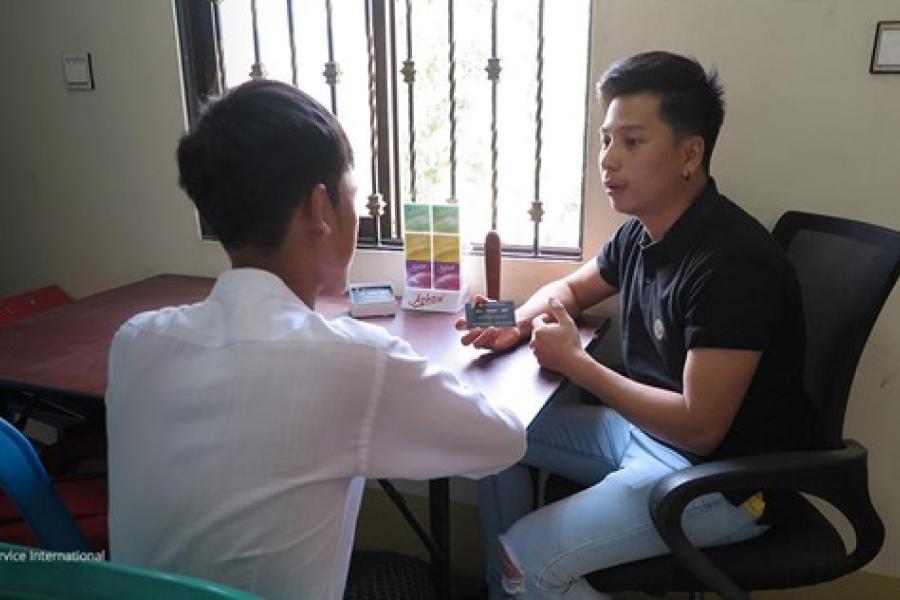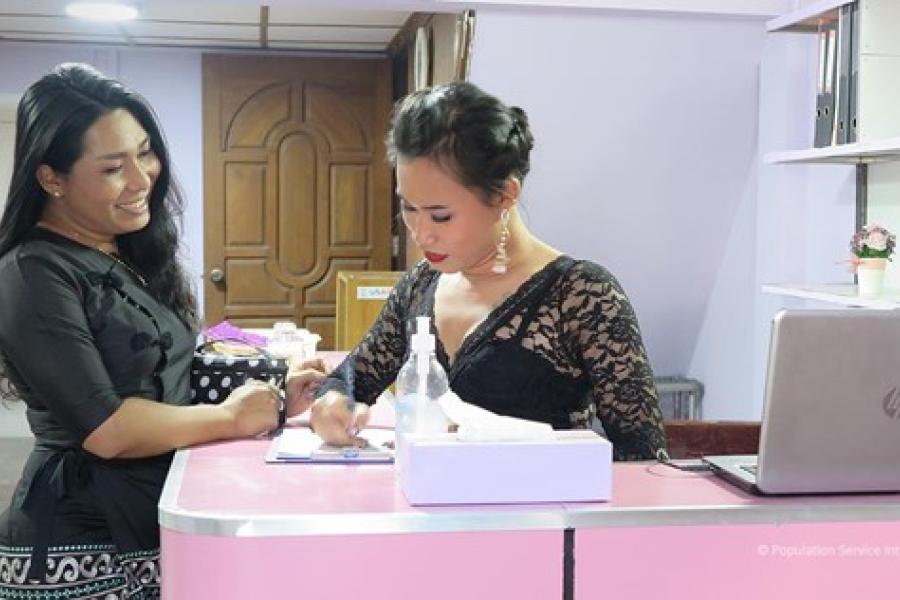An LGBTQI+ inclusion initiative piloted by UNOPS give hope for delivering accessible and sensitive healthcare across Myanmar
LGBTQI+ inclusion initiatives piloted under a new project by UNOPS in Myanmar give hope for delivering accessible and sensitive healthcare across the country.
The United Nations Office for Project Services (UNOPS) in Myanmar is undertaking a process of sensitising their healthcare programming to better meet the needs of the LGBTQI+ population. LGBTQI+ inclusion initiatives are being piloted in a new five-year programme funded by the Global CSR Program of the Takeda Pharmaceutical Company Limited, a values-based and development-driven biopharmaceutical leader headquartered in Japan.
“I was afraid to do this, but I am afraid of the people more”, declared Kyaw Zin Win, 25, on his Facebook page before taking his own life in June 2019. His final Facebook statement explained that it was because of the months of homophobic bullying in his workplace that had led him to commit suicide.
In Myanmar, sexuality and gender identity remain taboo topics, and those that identify as LGBTQI+ are criminalised and can face discrimination in many aspects of their lives. Research has confirmed the harmful stigma and discrimination experienced by Myanmar’s highly marginalized LGBTQI+ community. A 2020 study revealed that 1-in-3 people of a national sample did not accept or support LGBTQI+ people. And while 74% felt it should not be illegal to be LGBTQI+, 50% would find it completely unacceptable if their child was LGBTQI+.
These attitudes have a profound impact upon the mental health of Myanmar’s LGBTQI+ community with another study in 2021 uncovering that in a sample of over 1,500 LGBTQI+ identifying persons, nearly 1-in-4 had engaged in self-harming activities and 15% had made an attempt on their life. At the same time, the stigma and discrimination create major obstacles for LGBTQI+ communities to access healthcare services.
Kyaw Zin Win did not hide how he felt being discriminated for identifying himself as a LGBTQI+ person on numerous occasions, hinted through his Facebook posts that he may have contemplated suicide. His social media posts were not only evidence of the bullying that he was facing, but a cry for help and a need for psychosocial support which could have saved his life had he had access to it.
A 2021 report by &PROUD and UNFPA unveiled the discriminatory attitudes and practices by health workers toward LGBTQI+ individuals, ranging from disrespectful treatment to blatant abuse and extremely limited access to services. Hostile attitudes in healthcare settings can prevent members of the LGBTQI+ community from accessing health services – a situation which is amplified in more conservative rural areas. Transgender people, particularly trans women, are at greatest risk of experiencing mistreatment.
“I’m afraid to go to hospitals and clinics because I can’t bear people’s assumptions and judgements”, revealed a transgender women interviewed in Yangon for the &PROUD and UNFPA Study.

Systematically cascading knowledge and actions
Driven by a commitment to ensure everyone has equal access to health services, UNOPS Myanmar is undertaking a process of sensitising their healthcare programming to better meet the needs of the LGBTQI+ population. A recently launched 5-year programme funded by Takeda is being used to pilot LGBTQI+ inclusion initiatives. The programme aims to improve the capacity of ethnic health organizations to deliver key health services for underserved communities in Myanmar’s Shan State.
The Takeda grant was selected for two core reasons: first, that the programme is in its infancy, allowing for LGBTQI+ sensitivity to be mainstreamed within the bedrock of activities, and secondly, the geographic specificity of the programme in rural Shan State will make the impacts easier to monitor and evaluate. Nevertheless, ongoing armed conflict, contested administrations, linguistic diversity, and conservative attitudes, make this challenging terrain for attitudinal change.
The approach aims to cascade sensitivity towards LGBTQI+ people throughout the programme, starting with the UNOPS team. Across September 2021, a series of internal trainings were run by a locally-hired LGBTQI+ specialist, where staff were introduced to core concepts of SOGIESC – sexual orientation, gender identity/expression and sex characteristics – and the nature of discrimination towards LGBTQI+ people. There was an overwhelmingly positive response and strong engagement across the office.
“I now believe that awareness-raising is very important so that LGBTQI+ persons are seen as normal as someone else and treated equally. In my team, we have successfully influenced to make efforts to mainstream LGBTQI+ inclusion in prevention and responding to PSEA”, said Dr. Thiri Kyaw Myint, PSEA Capacity Building Senior Officer, reflecting on her experiences and how these conversations are immediately being put into action.
LGBTQI+ sensitivity was further woven into training sessions conducted with Takeda’s implementing partners. The workplans of each partner were systematically reviewed to inform a series of workshops dedicated to identifying opportunities for LGBTQI+ inclusion and plotting out roadmaps for the implementation of LGBTQI+ sensitive activities. Plans include the sensitisation of data collection practices to account for LGBTQI+ identities, training healthcare staff to be sensitive to LGBTQI+ needs and realities and firming up internal anti-discrimination policies.
“I have learnt how important it is to address LGBTQI+ in every level of community engagement as well as among different stakeholders, in order to guarantee LGBTQI+ can equally access the essential healthcare services,” said a Senior Programme Manager at Community Partners International.

Cautiousness is key, buy-in is essential
The major task identified by partners in the upcoming months involves high-level advocacy with the leaders of ethnic health organisations to secure their support pertaining to LGBTQI+ inclusivity. Rather than pursuing LGBTQI+ inclusion as a discrete and potentially polarising issue, framing LGBTQI+ sensitivity within an overarching goal of universal healthcare will be the core strategy.
As one of the country’s most vulnerable groups, it is critical that LGBTQI+ people are not left behind as healthcare infrastructure expands and evolves, that this work is done cautiously to ensure the safety and security of the LGBTIQ+ community, and that all actions are sensitised by ensuring their voices are taken into account.
The road ahead will not be easy but UNOPS Myanmar is proud to play an active role in helping build a more equal future for the people of Myanmar.


